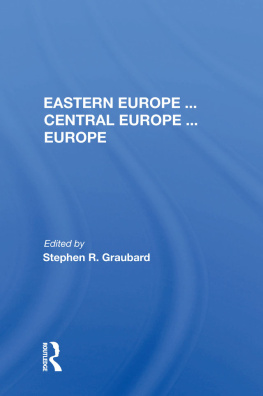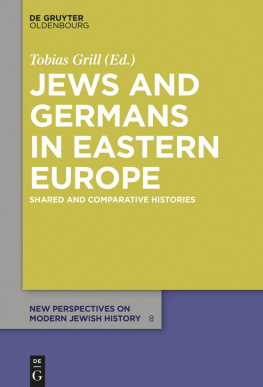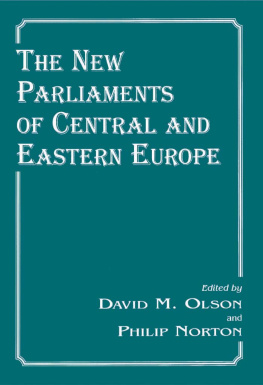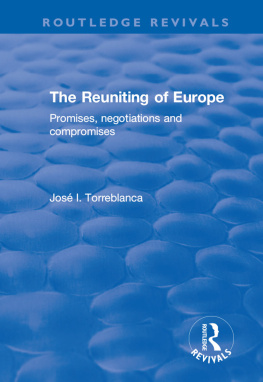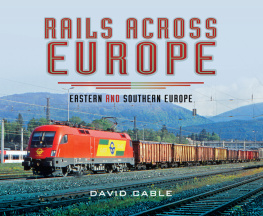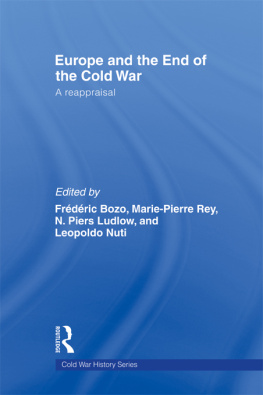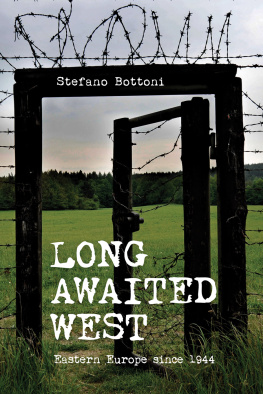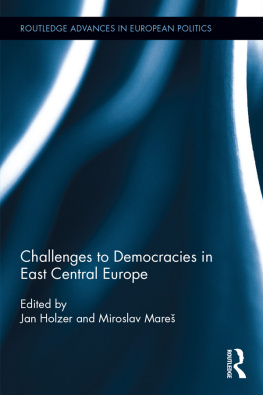EASTERN EUROPE ... CENTRAL EUROPE ... EUROPE
First published 1991 by Westview Press, Inc.
Published 2018 by Routledge
52 Vanderbilt Avenue, New York, NY 10017
2 Park Square, Milton Park, Abingdon, Oxon OX14 4RN
Routledge is an imprint of the Taylor & Francis Group, an informa business
Copyright 1991 Taylor & Francis
All rights reserved. No part of this book may be reprinted or reproduced or utilised in any form or by any electronic, mechanical, or other means, now known or hereafter invented, including photocopying and recording, or in any information storage or retrieval system, without permission in writing from the publishers.
Notice:
Product or corporate names may be trademarks or registered trademarks, and are used only for identification and explanation without intent to infringe.
Library of Congress Cataloging-in-Publication Data
Eastern Europe... Central Europe... Europe / edited by Stephen R. Graubard.
p. cm.
Includes index.
ISBN 0-8133-1189-6 (hc). ISBN 0-8133-8150-9 (pb).
1. Europe, EasternPolitics and government1989- 2. Central EuropePolitics and government. I. Graubard, Stephen Richards.
DJK51.E26 1991
940.5dc20
90-24995
CIP
ISBN 13: 978-0-367-00400-2 (hbk)
Nineteen eighty-nine will almost certainly figure as one of the seminal years in twentieth-century European history, perhaps in world history. Although it is not certain to achieve the universal, almost instantaneous recognition that is connected to certain other dates, including 1789, 1815, 1848, 1870, 1917, 1933, 1939, and 1945, there are few other years in the post-World War II era that compare with it. Many other years have seemed crucial in their time, and one thinks immediately of 1953, the year of Stalin's death and the East Berlin uprising; 1956, the year of the Hungarian revolution and the aborted efforts by Great Britain and France to keep Nasser from seizing control of the Suez Canal; 1968, the year of the Soviet crackdown on Czechoslovakia and of growing student rebellions in Western Europe, particularly in France, where de Gaulle's Fifth Republic seemed on the verge of collapse; 1973, the year of the first of the oil crises and the rise of a new international force in OPEC; and several other years since that might be considered important because of the elections of Margaret Thatcher in Great Britain and Ronald Reagan in the United States and the rise to power of Mikhail Gorbachev in the Soviet Union, However, it is not likely that any of these years will seem as monumental from the perspective of the twenty-first century as 1989because of the events in Eastern Europe and the Soviet Union.
Military and political conditions largely created by the events of World War II, in part ratified by the Yalta agreements, and left essentially intact despite the continuing international discord and disagreementsconspicuous features of the whole of the Cold War periodwere accepted by much of the world as seemingly inevitable. They were the price that others were required to pay for the astonishing Soviet victory in World War II. Even though that price included such obviously glaring institutional aberrations as the construction of the Berlin Wall, dividing a city and a nation, few imagined that such malign inventions would soon disappear.
Indeed, when the group responsible for this book first assembled in Cambridge at the House of the American Academy of Arts and Sciences, in April 1987, there were many reasons for believing that the situation in Eastern EuropeCentral Europe was the phrase preferred by somealthough clearly and obviously changing, would not soon be wholly and radically transformed. Yet, a review of the transcribed discussions of that informal and closed conference suggests that the anticipations of change were real, though the timetable remained uncertain. Although no one explicitly said, "This cannot last; this will not last," compelling arguments were advanced for believing that Europe east of the Elbe was then in a state of transformation, that greater changes were almost certainly in the offing, and that Stalin's Cold War vision of the world evolving into some sort of Communist monolith was never really possible. (That vision was even less accurate in 1987 than it might have been some two or three decades previously.)
Acutely aware of the intellectual and political stirrings in large parts of the European Communist world, those who helped plan this study began by doubting that continued control by repressive Communist regimes was likely and questioning whether the efforts to create something like the "civil societies" of the West would be permanently defeated. After the meeting, I sought to give something of the flavor of the occasion to contributors to this volume who had not participated.
We start with a number of simple propositions: that history mattered enormously in the ways these individual societies developed after the Second World War; that today, politically, socially, economically, and culturally, there are substantial differences among them; that their individual populations, geographic locations, resources, and traditions need constantly to be taken into account. We are not interested in dwelling simply on the uniformities among them, though these, where they exist, will be given considerable attention.
I alluded to recent efforts of certain Communist systems to relate to their indigenous cultures and mentioned particularly the interest evoked, "in the instances of resistance to old-fashioned totalitarian controls, or at least certain kinds of Party domination." Again, reporting on the discussions held in Cambridge, I wrote with a certain calculated imprecision: "We think we know what the Soviet interest in the region is. Do we? What is the American interest, the British interest, the Japanese interest? Who, in short, is paying heed to this region, and why?"
In late 1987 and early 1988 invitations went to scholars and others who knew the problems of the region intimately; the majority lived either in Western Europe or in the area we were increasingly defining as Central or Eastern Europe. Given all that has happened since 1988, it is important to recall how events stood even as late as the winter months of that year. It was a time when it was impossible to ask for anything but anonymous contributions from individuals in certain countries. Men and women who were open and known dissidents felt free to write under their own names, having already done so frequently at some risk to themselves in both European and American publications. There were others, however, who chose to be more careful, who risked a great deal by writing, who were best reached not through invitations sent by open mail but by much more discreet means, generally involving individuals who would act as trusted intermediaries. In certain countries, the controls were so exacting, the penalties so severe, that one did not even consider asking for a contribution. As the project on Eastern Europe proceeded, it became increasingly clear that those countries included, obviously, Romania and Albania, but also certain others that were still governed by people whose sympathies for the more orthodox Stalinist policies were as conspicuous in 1988 as they had been in 1953.

